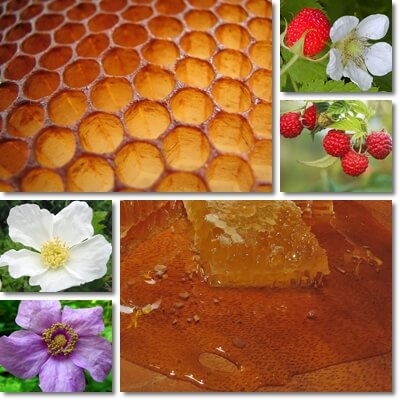Raspberry honey is one of the best honey varieties for anyone who likes plain tasting honey. It has a standard honey taste, without any unusual flavors, but it’s a good honey with substantial benefits for health. Raw, organic raspberry honey can help calm cough and relieve sore throat discomfort, and exerts topical antibacterial properties. Taken on an empty stomach, it relieves digestive upset in gastritis and calms heartburn caused by acid reflux. As for its cosmetic uses, raspberry honey helps brighten skin and even out skin tone, soothes sensitive skin, hydrates and nourishes dry skin and clears black heads and excess sebum in oily skin.
What is raspberry honey?
Raspberry honey is one of many varieties of honey. Also known as raspberry blossom honey or raspberry floral honey, raspberry honey is a floral honey as opposed to forest honeys or honeydew honeys (e.g. Halkidiki Greek pine honey, hickory honey, Romanian and Bulgarian mana honey). Raspberry honey is a monofloral honey, that is, it’s made from predominantly one nectar source: raspberry flower nectar.
Of course, bees will source other flowering plants for nectar so expect some benign contamination with honey from other floral sources. Still, the majority of the honey present in your jar of raspberry honey will be produced, or should be produced, from nectar collected from raspberry blossoms. Raspberry honey is one of the rarer varieties of honey, especially if it’s wild type, that is, sourced from raspberry shrubs occurring naturally in the wild instead of cultivated plants.

What does raspberry honey look like?
Raspberry honey can be produced essentially anywhere raspberry plants grow, from any species of raspberry, wild-type or cultivated. But flower nectar and pollen color can differ between raspberry species, and most certainly differ between all the different flowering plants honey bees may have access to. Which means there can be some degree of variation when it comes to how raspberry honey looks.
For the most part, raspberry honey is a typical golden-honey color, although it can be somewhat darker too, but not too dark (not like chestnut honey or buckwheat honey). If your raspberry honey is a slightly darker yellow, it may be because of the presence of wildflower or forest honeys which are often darker colored. Crystallized raspberry honey will lighten though, becoming a pale amber color and opaque.
What does raspberry honey taste like?
In terms of taste, raspberry honey is like the acacia honey of the rarer honey varieties. That is, it’s almost plainly sweet, with maybe some faint fruity and floral notes, but nothing unusual or particular. Raspberry honey has a moderate taste intensity and is overall pleasant, slightly thicker than other honey varieties. Raspberry honey is not very smooth after a while as it crystallizes somewhat quickly which causes it to develop a grainier texture. This is one of the reasons why you can often find, and people buy, creamed raspberry honey instead of raw. Find out how to make creamed honey at home.

Does raspberry honey crystallize?
Raspberry honey crystallizes somewhat quickly, usually within a year, causing the honey variety to become grainy in texture and hard, which some people find unpleasant. The crystallization process is driven by the sugar glucose found naturally in all honeys. To delay crystallization time, raspberry honey is filtered.
Even when you raspberry honey crystallizes, don’t worry because it’s still good to eat. Crystallized honey is not spoiled honey and carries the same properties and health benefits as it did in the beginning. Discover the difference between crystallized honey and liquid honey.
Raspberry honey nutritional value
Do you know what is in your raspberry honey? Raspberry honey is over 80% sugar and around 17% water (some honeys have a water content of only 13%), which are average values for honey. Only about 1% of the actual honey is represented by components with bioactive properties. Raspberry honey isn’t ‘packed’ with vitamins, minerals or antioxidants – it’s mostly sugar: glucose, fructose and, to a lesser extent, sucrose, maltose and galactose sugars. It isn’t high in vitamin C, B vitamins, calcium, potassium or iron, like some sources would have you believe.
Despite its very poor nutrition value, raspberry honey contains bioactive antioxidants, probiotic oligosaccharides, unique enzymes and antimicrobial compounds which are sources of important benefits for health.
What are the benefits of raspberry honey?
Actively inhibits bacteria growth
Although not as effective as antibiotics, raw raspberry honey does have active antibacterial properties. Raspberry honey contains natural antibacterial agents such as hydrogen peroxide and gluconic acid which inhibit bacteria growth and reduce bacterial load. The low moisture content and low pH further contribute to the antibacterial effects of raspberry honey.
Exerts a topical antiseptic action
An antiseptic is an agent that destroys bacteria and other microorganism that can cause disease. By inhibiting bacterial and fungal growth, biologically active components in raspberry honey (hydrogen peroxide, gluconic acid) exert an antiseptic action upon contact and can help prevent and control infection.
Raspberry honey is antifungal
Honey in general has been shown to exert active antifungal properties against pathogenic Candida species such as Candida albicans.
Good for respiratory tract infections
If you have a respiratory tract infection, it can help to take a tablespoon of raw raspberry honey a few times a day (and avoid eating and drinking for up to an hour afterwards). Antibacterial agents in the honey variety actively inhibit bacteria growth, while bioactive compounds such as pollen trigger an immune system reaction that activates the immune system response and associated antibacterial, antiviral and antifungal actions.
And because of its high sugar-low water water that makes it dense and viscous, raspberry honey creates a protective film over the throat lining that both helps control the infection and provides relief from soreness.
Helps calm cough and relieve throat soreness
Raw raspberry honey can make a good natural remedy for throat soreness and cough. The viscosity of the honey caused by its sugar-to-water ratio makes it so that the honey sticks to the throat lining, creating a protective film that helps soothe sore throat irritation. The honey can also help calm cough caused by a respiratory infection or acid reflux.
Tonic, energizing action
Raspberry honey is over 82% sugar which makes it a high-energy food. It can be consumed in small amounts by anyone looking to get quick energy because the simple sugars in the honey will get absorbed quickly into the bloodstream and raise blood sugar levels for a boost in vitality.
Combats hypoglycemia
One tablespoon of raspberry honey can instantly raise blood sugar levels and restore energy and vitality. Raw honey is a good choice if you are experiencing side effects associated with low blood sugar, such as: headaches, lightheadedness, dizziness, lethargy and sluggishness, fainting, cold sweats, palpitations, irritability or agitation.
Helps relieve heartburn pain
If you are experiencing heartburn, you can have a few sips of water and, after a few minutes, take a tablespoon of raw raspberry honey to calm and soothe the irritation of the esophagus, aka heartburn, caused by regurgitating stomach juices.
Benefits for gastritis
Raw raspberry honey can be consumed on an empty stomach in the morning as it helps calm digestive upset, reduce stomach pain and inflammation associated with active gastritis. Taken together with pure Aloe Vera gel preparations, it can even help get rid of gastritis.
Good for small wounds, insect bites and minor burns
Raw raspberry honey applied on small wounds, insect bites or minor burns creates a protective coating that both soothes and calms pain and inhibits bacteria growth, reducing risks of infection and advancing healing.
Benefits for skin
Raw raspberry honey exerts gentle exfoliating and astringent effects, helping unclog and minimize pores and tighten skin for a more youthful appearance. It nourishes and hydrates dry skin, and clears excess sebum that affects oily skin, without being too harsh. Raspberry honey is a good cleanser for sensitive skin and combats dull skin and uneven skin tone (to a certain extent).
What are the side effects of raspberry honey?
- Allergic reactions. It is possible to experience an allergic reaction to raspberry honey. Avoid consumption if you already have an allergy to other honey varieties or honey bee products, raspberries or raspberry pollen, or more than one pollen source.
- Contraindications: children under 1 year of age. Honey, raw honey more exactly, while healthy, is contraindicated for children under 1 year of age due to risks of botulism.
- Contamination risks. If the area of production of the honey is in the proximity of a highly polluted environment (e.g. industrial area, pesticide-laden soil), the honeybees can transfer contaminants such as heavy metals to the honey, albeit in trace amounts.
